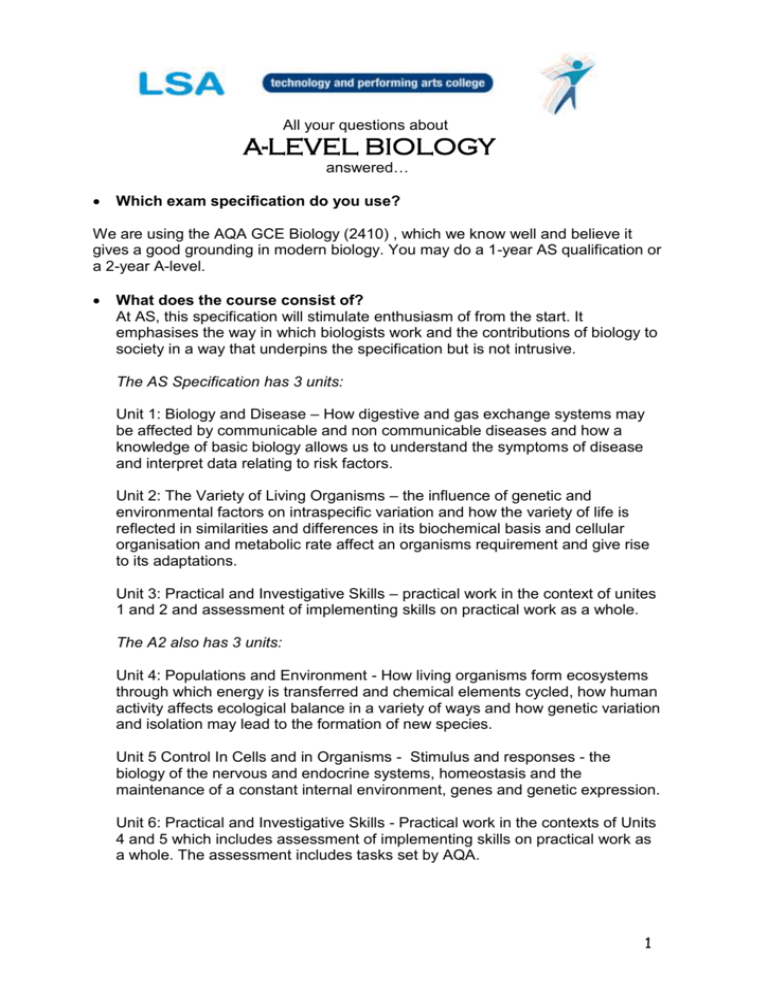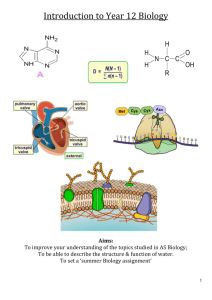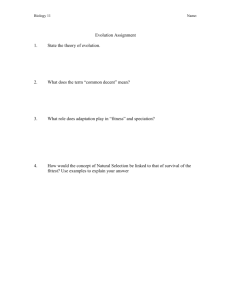A-Level Biology
advertisement

All your questions about A-LEVEL BIOLOGY answered… Which exam specification do you use? We are using the AQA GCE Biology (2410) , which we know well and believe it gives a good grounding in modern biology. You may do a 1-year AS qualification or a 2-year A-level. What does the course consist of? At AS, this specification will stimulate enthusiasm of from the start. It emphasises the way in which biologists work and the contributions of biology to society in a way that underpins the specification but is not intrusive. The AS Specification has 3 units: Unit 1: Biology and Disease – How digestive and gas exchange systems may be affected by communicable and non communicable diseases and how a knowledge of basic biology allows us to understand the symptoms of disease and interpret data relating to risk factors. Unit 2: The Variety of Living Organisms – the influence of genetic and environmental factors on intraspecific variation and how the variety of life is reflected in similarities and differences in its biochemical basis and cellular organisation and metabolic rate affect an organisms requirement and give rise to its adaptations. Unit 3: Practical and Investigative Skills – practical work in the context of unites 1 and 2 and assessment of implementing skills on practical work as a whole. The A2 also has 3 units: Unit 4: Populations and Environment - How living organisms form ecosystems through which energy is transferred and chemical elements cycled, how human activity affects ecological balance in a variety of ways and how genetic variation and isolation may lead to the formation of new species. Unit 5 Control In Cells and in Organisms - Stimulus and responses - the biology of the nervous and endocrine systems, homeostasis and the maintenance of a constant internal environment, genes and genetic expression. Unit 6: Practical and Investigative Skills - Practical work in the contexts of Units 4 and 5 which includes assessment of implementing skills on practical work as a whole. The assessment includes tasks set by AQA. 1 How many exams are there? In Year 12: Unit 1 BIOL1 Biology and disease The examination paper consists of 5 – 7 short answer questions plus 2 longer questions (a short comprehension and a structured question requiring continuous prose) and is 1 hour 15 minutes long. It makes up 33.3% of the total AS marks 16.7% of the total A Level marks. Unit 2 BIOL2 The variety of living organisms The examination paper consists of 7 – 9 short answer questions plus 2 longer questions (1 data handling and 1 assessing analysis and evaluation) and is 1 hour 45 minutes long. It makes up 46.7% of the total AS marks and 23.3% of the total A Level marks. Unit 3 – Internal Assessment Investigative and practical skills in AS Biology This involves Practical Skills Assessment (PSA) which are gained during normal lab work and the Investigative Skills Assignment (EMPA) which is set and marked by AQA examiners. In Year 13: Unit 4 BIOL4 Populations and environment The examination paper consists of 6– 9 short answer questions plus 2 longer questions involving continuous prose and How Science Works and is 1 hour 30 minutes long. It makes up 16.7% of the total A Level marks. Unit 5 BIOL5 Control in cells and in organisms The examination paper consists of 8 – 10 short answer questions plus 2 longer questions (a data-handling question and a synoptic essay - choice of 1 out of 2) and is 2 hours 15 minutes long. It makes up 23.3% of the total A Level marks. Unit 6 – Internal Assessment Investigative and practical skills in A2 Biology This involves Practical Skills Assessment (PSA) which are gained during normal lab work and the Investigative Skills Assignment (EMPA) which is set and marked by AQA examiners. How many students take biology? In 2012 -2013, there are 35 students studying biology at AS level, split into three sets. How big are the teaching groups? This year the biggest set in Year 12 has 20 students. How much teaching time is there? Like all A-level subjects, there are 9 hours of lessons per fortnight. 2 Is there much practical work? Yes, we try to fit in as much practical work as possible in preparation for the coursework (EMPA). Will I need to dissect animals? No. There will be opportunities to dissect organs, where we believe this helps in the understanding of anatomy and physiology. Students who do not wish to take part need not do so, and it is possible to complete the A-level course without doing dissections. What about coursework? In each year there is practical work in the contexts of Units 1 and 2 and Units 4 and 5 at A2. This involves assessment of implementing skills on practical work as a whole. The assessment involves tasks set by AQA. Will I have to do much homework? Oh yes! You are expected to spend at least as much time studying on your own as you spend in class. Will I need to takes lots of notes? Some lessons may involve note taking but all students have access to a full set of notes for each unit which can be found on the subject drive of the school’s intranet. This saves a lot of times in lessons so we can do more interesting things, like practicals, discussions, presentations, research and finishing the course in plenty of time for the exams. You can then annotate and highlight your notes, and your teachers may give you some extra notes, to add detail or give further explanation. Student can download the notes for themselves. Will I get a text book? Not permanently – we have a set for use in class but there are also text books available in the library which can be used for independent learning. Some students have chosen to buy their own copy of the recommended AQA Biology Text book but remember, everything you need to get through the exams is in the notes which you can download. What Are The Entry Requirements? At least 5 C-grades at GCSE A Grade A OR A* in GCSE biology and a B in GCSE mathematics. Self-discipline and motivation to succeed. A-level biology is not an "easy option"; it is extremely demanding and is often considered by students to be one of the most difficult A-levels, since it covers such a wide range of skills and knowledge. 3 Do I need to be good at Maths /Chemistry / IT? You need to be competent in these subjects. Biology is a quantitative science, and you will need to do some statistics and other calculations during the course. There is also biochemistry in modern biology, so you should be comfortable with chemistry. We are well equipped with computers, and you will be expected to use these for calculations, analysis, simulations, reports and research. What Grade will I get? We can't tell you, but in 2012, 53% of our AS biology students obtained grade A or B. Can I go on holiday after the AS exams in year 12? No. After the exams, lessons start again and we start the A2 course. We cover most of Unit 4 at the end of year 12, so if you want to carry on with A2 biology in year 13, you must attend these lessons. What have previous students said about the course? " Biology is an interesting subject, and is not spoiled by there being too much work to do!" " Non stop fun - brightens up any boring day!" " Teachers are friendly and there's a relaxed atmosphere. You certainly get treated like adults." " Biology is a subject that requires hard work and dedication." Where Do AS and A-Level Biology Lead? A good grade in Biology A level is a requirement for university courses in medicine, dentistry, veterinary science and other medically-related degrees. But A-level Biology also provides a useful background to a wide variety of higher education courses. In recent years previous students have gone on to study: medicine, dentistry, veterinary science, radiography, nursing, physiotherapy, pharmacology, pharmacy, chiropody, psychology, forensic science, archaeology, marine biology, biological science, ecology, sports studies, biochemistry, accountancy and even teacher training! 4






